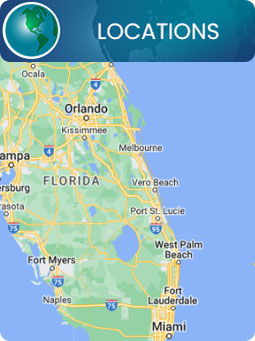Cluneal Nerve Block for Chronic Pain Treatment Specialist
Cluneal nerve blocks are used to treat persistent pain caused by irritation of these nerves. A nerve block injection may provide comfort if you have cluneal nerve entrapment, which causes low back and buttock pain. Visit Global Neuro & Spine Institute, our board-certified pain management specialist, Dr. Michael S. Slobasky, DO, DABPMR would be pleased to serve you. For more information, please contact us or book an appointment online. We have convenient locations in Orlando FL, Jensen Beach FL, Malabar Palm Bay FL, Atlantis FL, Fort Pierce FL, Winter Park FL and Plantation, FL.


Table of Contents:
What is a cluneal nerve block?
What does cluneal nerve pain feel like?
What happens after a cluneal nerve block?
What are the symptoms of cluneal nerve entrapment?
A cluneal nerve block is a minimally invasive procedure that is performed to alleviate pain in the lower back, buttocks, and legs caused by irritation or compression of the cluneal nerves. The cluneal nerves are located in the lower back and buttock region and provide sensory information to the skin overlying these areas. When these nerves become irritated or compressed due to injury, inflammation, or other conditions, they can cause pain, tingling, numbness, or weakness in the affected area. A cluneal nerve block involves injecting a small amount of a local anesthetic and/or steroid medication near the affected nerve to reduce inflammation and provide pain relief.
Before the procedure, the patient will be given local anesthesia to numb the injection site. Using fluoroscopic guidance, a needle is then inserted near the affected cluneal nerve, and medication is injected into the surrounding tissue. The patient may experience some temporary discomfort during the injection, but this is generally mild and short-lived.
Cluneal nerve pain typically presents as a sharp or burning pain in the lower back, buttocks, or legs. Patients may also experience tingling, numbness, or weakness in the affected area. The pain may be aggravated by sitting or standing for long periods, twisting or bending, or by certain activities such as running or jumping. In some cases, the pain may be referred to other areas of the body, such as the groin or thighs.
Cluneal nerve pain is often caused by irritation or compression of the nerves due to injury, inflammation, or other conditions such as spinal stenosis or degenerative disc disease. It can also be caused by activities that put repeated stress on the lower back, such as heavy lifting or prolonged sitting. Proper diagnosis and treatment of cluneal nerve pain are important to prevent it from becoming chronic and interfering with daily activities.
After a cluneal nerve block, patients may experience some temporary numbness or weakness in the affected area due to the anesthetic medication. This typically resolves within a few hours. Patients may also experience some pain relief immediately after the injection, although it may take several days to experience the full effects of the medication.
Patients are typically able to resume their normal activities immediately after the procedure. They may be advised to avoid strenuous activities or heavy lifting for a short period. It is also important to monitor the injection site for any signs of infection, such as redness, swelling, or drainage.
In some cases, patients may need to undergo additional injections to achieve long-lasting pain relief. If the procedure is not effective, other treatments such as physical therapy, medications, or surgery may be recommended. Patients should discuss their treatment options with their healthcare provider.
The symptoms of cluneal nerve entrapment can vary from person to person, but they generally include pain in the lower back, hip, or buttock region. This pain can range from a dull ache to a sharp, shooting pain that radiates down the leg. Other common symptoms include numbness or tingling in the affected area and muscle weakness.
Some people may also experience a burning or itching sensation in the skin over the affected area, or a sensation of pins and needles. These symptoms may be intermittent or constant and may worsen with certain activities, such as sitting or standing for prolonged periods.
In some cases, cluneal nerve entrapment may also cause referred pain in other parts of the body, such as the groin, thigh, or knee. This can make diagnosis and treatment more difficult, as the source of the pain may not be immediately apparent.
Cluneal nerve block for chronic pain treatment specialists is available at Global Neuro & Spine Institute. For more information, please contact us or book an appointment online. We serve patients from Orlando FL, Conway FL, Edgewood FL, Jensen Beach FL, Ocean Breeze FL, Rio FL, Malabar Palm Bay FL, Melbourne FL, Atlantis FL, Palm Springs FL, Boynton Beach FL, Fort Pierce FL, White City FL, St Lucie FL, Plantation FL, Pine Island Ridge FL, Lauderhill FL, Winter Park FL, Bertha FL, Alafaya FL and surrounding areas.

CONDITIONS WE TREATED:
- Facet Joint Disorders
- Back Surgery Complications
- Migraines
- Herniated Discs
- Back Pain
- Lower Back Pain
- Neck Pain
- Sciatica Pain
- Abdominal Pain
- Compression Fractures
- Joint Pain Treatments
- Shoulder Pain Treatments
- Elbow Pain Treatments
- Hip Pain Treatments
- Knee Pain Treatments
- Diabetic Peripheral Neuropathy
- Complex Regional Pain Syndrome
- Pelvic Pain
- Occipital Neuralgia
- Chest Wall Pain
- Chronic Facial Pain
- Phantom Limb Pain
- Interstitial Cystitis – Pelvic Pain
- Herpetic Neuralgia
- Cervical Radiculopathy
- Degenerative Disc Disease
ADDITIONAL SERVICES
- Kyphoplasty
- Epidural Steroid Injection
- Posterior Facet Blocks – Rhizotomy
- Sacroiliac Joint Injection
- Percutaneous Discectomy
- Stellate Ganglion Blocks
- Intercostal Nerve Blocks
- Intra-Articular Peripheral Joint Injection
- Lumbar Epidural Steroid Injections
- Coccygeal Nerve Block
- Occipital Nerve Blocks / Rhizotomy
- Selective Nerve Root Blocks
- Discography
- Hardware Blocks
- Cluneal Nerve Block
- Spinal Cord Stimulators
- Sympathetic Nerve Blocks
- Headaches Treatments

CONDITIONS WE TREATED:
- Facet Joint Disorders
- Back Surgery Complications
- Migraines
- Herniated Discs
- Back Pain
- Lower Back Pain
- Neck Pain
- Sciatica Pain
- Abdominal Pain
- Compression Fractures
- Joint Pain Treatments
- Shoulder Pain Treatments
- Elbow Pain Treatments
- Hip Pain Treatments
- Knee Pain Treatments
- Diabetic Peripheral Neuropathy
- Complex Regional Pain Syndrome
- Pelvic Pain
- Occipital Neuralgia
- Chest Wall Pain
- Chronic Facial Pain
- Phantom Limb Pain
- Interstitial Cystitis – Pelvic Pain
- Herpetic Neuralgia
- Cervical Radiculopathy
- Degenerative Disc Disease
ADDITIONAL SERVICES
- Kyphoplasty
- Epidural Steroid Injection
- Posterior Facet Blocks – Rhizotomy
- Sacroiliac Joint Injection
- Percutaneous Discectomy
- Stellate Ganglion Blocks
- Intercostal Nerve Blocks
- Intra-Articular Peripheral Joint Injection
- Lumbar Epidural Steroid Injections
- Coccygeal Nerve Block
- Occipital Nerve Blocks / Rhizotomy
- Selective Nerve Root Blocks
- Discography
- Hardware Blocks
- Cluneal Nerve Block
- Spinal Cord Stimulators
- Sympathetic Nerve Blocks
- Headaches Treatments






